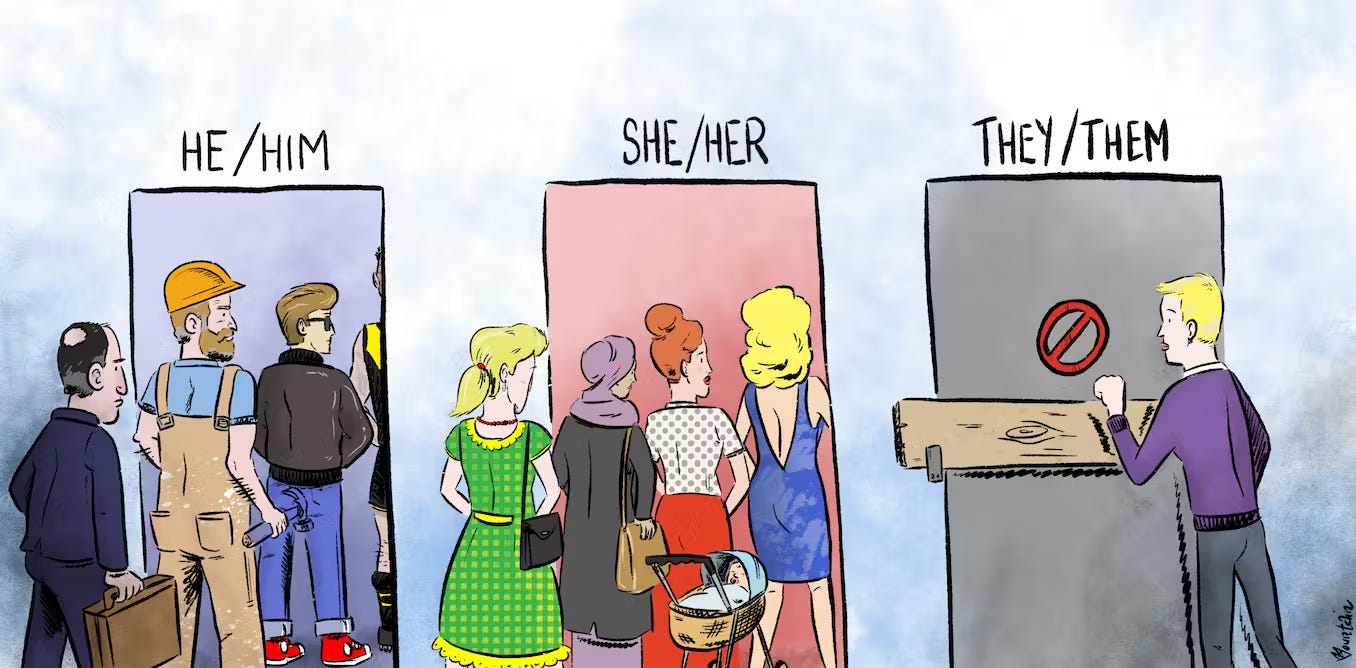
The short version:
I had a surprisingly hard time with preferred pronouns. Ack!
The longer version:
Pronouns, along with Drag Queens, hit my radar as just another bogey in the Culture-War-Stampede™, a big scary Flying Monkey designed to distract everyone from the economic inequality and absence of responsible governance brooding in the hearts of the MagaHerd cattle drivers.
Frankly, I never imagined this would be difficult, but then I never imagined they’d gin up critical race theory into a Bizarro World Tower of Babble [sic] either. Anyway, using pronouns to refer to people the way they’d like to be referred to shouldn’t be that hard, right?
Given the reaction of the MagaHerd, you’d think the universe was ending, but it turns out I had a hard time with it too. That was an uncomfortable surprise, so let me start out by being defensive.
I’m pretty woke, I’ll just say it, and I know this for all the same (often disastrous) reasons cis-gendered hetero-boring folks like me say they’re woke: because I have a lot of gay friends. Okay, yeah, I actually just said that. I have a lot of friends and students and friendly acquaintances from across the racial/ethnic/LGBTQAI+ rainbow of non-binary possibilities and they all seem to like me just fine.
For example:
I had what was, essentially, the perfect first gay friend (hey Matt!), who was able to help me get my naïve 17 year old brain around the idea of gender preference.1 I work with plenty of people who identify as queer or non-binary, good friends who have come out after years on one side of the binary, and more than a few of my former students-now-friends have transitioned. I’ve read widely throughout the academic and polemical literature and feel sufficiently competent to lecture on these issues in my classes, laying out the lines of argument along with the social, historical, and cultural contexts.
And forget about the academic stuff for a minute: non-heteronormative gender preferences just make sense to me. I didn’t have any choice about which gender I identified with or found sexually attractive, and it’s an easy jump (to the left or a step to the right) to recognize that none of my LGBTQIA+ friends and acquaintances did either. I have not had their experience with gender preference and identity and, it turns out, they didn’t have mine either. The only difference is that my experience of gender preference and identity was socially sanctioned and theirs wasn’t.
Pretty much all I needed to know. All done.
Oh, and I recognize I’m inevitably still harboring any number of triggers, micro-aggressions, and (especially) habituated biases that will put lie to my self-evaluation as progressive-white-guy-ally. That’s why I’m being a little defensive here. That’s also why I always try to remember what MLK said about the dangers of liberal allies.
Having said all of that, of course, there are people on this planet who are not able to process what seems simple: recognizing that their experience isn’t the same as everyone else’s. In most places around the globe (including here in “the land of the free”), when gender preferences violate social and religious conventions, terrible things happen.
Terrible. Things.
And even when terrible things don’t happen, in some sense, terrible things have already happened because whenever someone whose gender preferences (and identity!) runs over a social-construction construction-cone, they have to hide their true selves: either by lying to everyone around them for self-preservation or by lying to themselves when social programming is powerful enough to mask the face they see in the mirror. That kind of repression can choke people to death with denial. Depression, despair, and a storm of swirling traumatic experiences follow — none of which were ever, really, necessary.
So, of all the Flying Monkeys in the Wicked Witch arsenal of the MagaHerd cattle drivers, you’d think encouraging the use of different pronouns wouldn’t be that big a deal for those of us on the supposedly “woke” side of the fence. The Digital Herd will make hay out of it, of course, but the rest of us should be able to flip the switch, make the adjustments, and begin to bend the arc of the moral universe toward justice. Right?
That’s what I thought.
Early on in the pronoun-conversation some of my more thoughtful and reflective students let me know that I needed to begin using their preferred pronouns. (“Okay Boomer?”) A lot of the upcoming generation had embraced the reality of gender fluidity and developed a preference for “him” and “her” for “they” — and I remember thinking, “Wow, this is so much better than what my queer friends had to go through back in the 70s, what a relief, what a breakthrough, what a good idea. Yeah, no problemo.”
— and then, I couldn’t do it.
It’s not that I didn’t want to start using their preferred pronouns. Decades of social conditioning simply made it stupidly difficult to do so. I’d find myself, over and over again, defaulting to tradition. My students were more than patient and I asked them to remind me whenever I’d fall back into habit… but Holy Motley Cow, Scooby.
Habit always rolls over you in the short run.
There are reasons, of course. I’m in my mid-60s, so there’s that generational thing going on. I grew up in a different social universe. I also lived in the Deep South long enough to have acquired the culturally required social programming, including “Yes, M’am” and “No sir”. Something easy to do, by the way, when your personal life-experience dovetails with the social expectations of the dominant culture. Failure to abide by these simple and automatic responses also would have meant social suicide as, again, it always does when the dominant culture weighs in.
It’s easy to find examples like this, of social conditioning that works against changes to our social conventions.
And I’m not sure we’ve talked about this enough: the challenges of pronoun use aren’t only about the failure of people to commit to an increasingly just and appropriate way of using the language, but about the more difficult process of re-habituating and undoing years (and generations) of cultural protocols that are no longer acceptable.
I mean, I was having a tough time and I wanted to make these changes but then I think: “Holy crap! There are people who consciously and deliberately don’t want to change.”
How can we expect them to — or even help them to?
I have no idea.
But wandering through Natalie Wynn’s material over at ContraPoints reminded me that maybe we can’t change the mind of a stampeding Digital Herd when it comes to Flying Monkeys. Nobody, for instance, ever convinced a member of the Klan to stop being racist and nobody, so far as I can tell, has convinced a Nazi to — well, stop being a Nazi. Maybe all we can do is mobilize and hope democracy will work. Maybe we can divert the stampede away from town to prevent it from trampling everything to pieces.
In any case, that’s my plan. If you’re having trouble too, cut yourself some slack and keep going. Old habits are hard to break but then, I was able to quit smoking, too.
I know, too serious. Here’s roughly the same point about referring to people by who they are rather than by who you think they ought to be.
This time a Flying Circus instead of Flying Monkeys.
hiho
He cleared up everything for me one night at a party. It took nearly a second or two. I was a little stoned and asked him (the way any unreflective 17 year old might) when he decided to be gay. He laughed and said “when did you decide to be straight?” I took the question seriously: “Okay, what I remember is that one minute I was into Hot Wheels and my bike, and the next minute it was girls.” “Same for me,” he said, “except for the part about girls.”
Click. All done.





I have the same problem. I'm totally OK with the bell curve of gender & sexual whatevers. I don't think it's my age. It's just too darnn difficult. I have a hard enough time recalling names. No way can I recall pronouns too. IMO it's especially difficult for teachers with multiple classes that change every semester. There's no perfect solution. The majority will always be the default. The minority, well, sorry. Short of wearing signage, your average person won't bother. Your ally person can't keep it straight. I do keep it straight for the handful of gay, lesbian, trans folks I know personally. But that's because I know them well and see them regularly. I try extra hard to say things right for the one trans person I'm close too, since everyone craps on them and their suicide risk is so high.